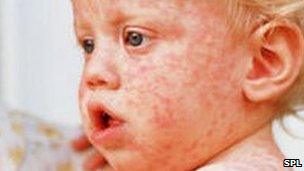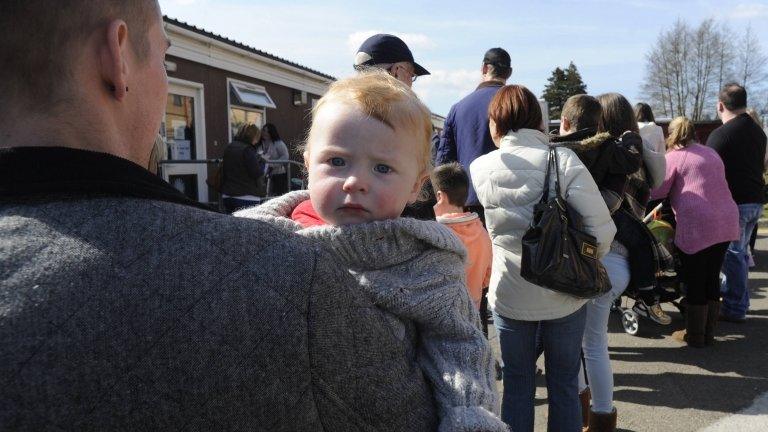Long shadow cast by MMR scare
- Published
- comments

It is 15 years since Dr Andrew Wakefield published research suggesting a possible link between the MMR vaccine and autism.
Although both he and his research have been discredited, the MMR scare still casts a long shadow.
That may seem improbable, given that MMR coverage rates now exceed the level they achieved before his claims were published in 1998.
First dose MMR coverage for England now stands at 89% in England and 92.7% in Wales - and latest quarterly figures for both countries suggest rates are edging towards the crucial 95% uptake the World Health Organisation says is needed to provide herd immunity and provide full protection.
But in 2004 it fell to 80% in England and 78% in Wales. That means more than 100,000 children were not protected in that year alone.
There is now a huge cohort of children who are not protected and this has allowed the measles virus to circulate - often infecting babies who are too young to have had the MMR vaccine.
There were 2,016 confirmed cases of measles in England and Wales in 2012, the highest total for 18 years.
The number of cases in the current Swansea outbreak has reached 620.
Epidemic
"The age range of those most affected exactly maps the period after the Wakefield scare, so very many are in the 10-14 age group", said Dr Paul Cosford, medical director, Public Health England.
Children should get two doses of the MMR vaccine - at around 13 months and a second pre-school booster.
The first gives about 95% protection against measles, while two doses gives 99-100% protection.
In Swansea it has taken a huge outbreak of measles to prompt parents to get their children immunised.
Parents there have been praised by public health officials for bringing their children to special drop-in vaccine clinics.
But immunisation officials want parents elsewhere to be proactive and not wait until they see an outbreak of measles in their area before getting their children immunised.
"The message is that it's never too late to get immunised - that means both teenagers and young adults.
Rash
"Parents who are unsure whether their children have had the MMR vaccine can check with their GP," said Dr Cosford.
Measles is a highly contagious viral infection. Prior to the introduction of a vaccine it was a major public health threat.

Measles is particularly dangerous in young infants but anyone can get the disease at any time.
In 1961 there were 750,000 cases in England and Wales and 152 deaths.
It causes a distinctive rash on the body - and can lead to meningitis and pneumonia.
Fortunately there have been no deaths so far in the current outbreak, but around one in five infants infected needs hospital treatment.
In theory measles could be eradicated - like smallpox it has no animal host. No country in the world has managed to eliminate the disease - although almost all cases in the United States are imported.
That used to be the situation here for several years until the current surge in cases.
The outbreak in Wales and others across the UK were the inevitable outcome of years of under-immunisation as this quote from Prof David Salisbury, Director of Immunisation at the 2008 demonstrates.
"Measles is serious and in some cases it can be fatal. Delaying immunisation puts children at risk.
"If we continue to accumulate unvaccinated children measles will spread among them - at some point there will be a measles epidemic.
"The evidence on MMR is absolutely clear - there is no link between the vaccine and autism."
What happens in the months and years ahead depends on how parents regard and respond to the current measles threat.
- Published9 April 2013
